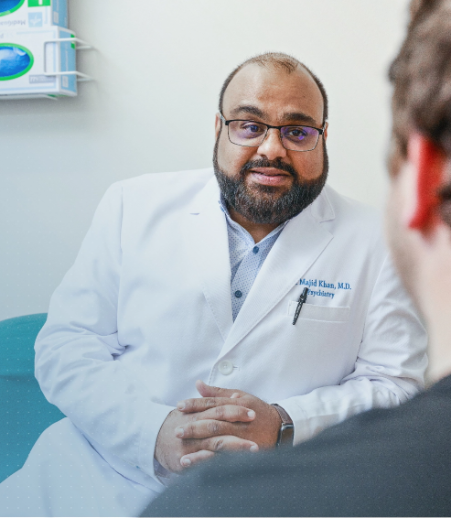Inpatient Mental Health and Dual Diagnosis Treatment
Regions Behavioral Health Hospital in Baton Rouge.
Ready to Respond to Crisis

If a patient is in crisis, our team at Regions Behavioral Hospital is ready to respond to their needs. Empathy and compassion are key to patient outcome. If a patient is feeling like they may harm themselves or others, or having psychiatric episodes that keep them from being able to function on their own, Regions can provide the resources they need to stabilize. We will work closely with the patient to develop a long-term plan to help them get back on track.
Crisis Intervention
Regions Behavioral Health Hospital will intervene in psychiatric crises and emergencies. We provide immediate assessment and intervention for individuals in acute distress. Our team of experienced mental health professionals is available 24/7 to stabilize patients, assess their needs, and create a personalized care plan. We understand that crises can be overwhelming, and our goal is to provide a safe and supportive environment to help individuals regain control and begin their path to recovery.
Individual Therapy
Individual therapy sessions with licensed therapists or counselors are available to address a variety of mental health issues. Our therapists use different therapeutic approaches tailored to each patient’s needs. These approaches include cognitive-behavioral therapy (CBT), which helps patients identify and change negative thought patterns; dialectical behavior therapy (DBT), which focuses on emotional regulation and interpersonal effectiveness; psychodynamic therapy, which explores the influence of past experiences on present behavior; and other evidence-based practices. Our goal is to provide personalized support to help patients achieve their mental health goals.
Group Therapy
Group therapy sessions bring together individuals with similar mental health concerns to discuss their experiences, share coping strategies, and receive support from both peers and trained therapists. These sessions foster a sense of community and belonging, which can be incredibly therapeutic. Participants can gain new perspectives on their issues, learn from others’ experiences, and develop stronger coping mechanisms. Our group therapy options cover a wide range of topics, including anxiety, depression, grief, trauma, and substance use.
Dual Diagnosis Treatment / Detox
Treating individuals who have co-occurring disorders, such as substance use disorders along with mental health conditions, is a specialty of Regions Behavioral Health Hospital. Dual diagnosis treatment integrates strategies to address both issues simultaneously, ensuring that neither condition is neglected. Our comprehensive approach includes medical detoxification to safely manage withdrawal symptoms, followed by integrated therapy to address the root causes of addiction and mental health issues. Our goal is to support long-term recovery by treating the whole person.
Medication Management
Regions’ psychiatrist, Dr. Khan, and medical professionals can prescribe and monitor medications to manage psychiatric symptoms. They work closely with patients to find the most effective medication regimen and adjust it as needed. Our team ensures that medication management is part of a comprehensive treatment plan, which may also include therapy and other interventions. We prioritize patient safety and well-being, providing regular follow-up appointments to monitor progress and address any concerns.
Psychosocial Education
Patients receive education about their mental health conditions, coping skills, stress management techniques, and strategies for relapse prevention. This education is a critical component of our treatment programs, as it empowers individuals with the knowledge and skills needed to manage their conditions effectively. By understanding their symptoms and triggers, patients can develop better strategies to cope with stress and prevent relapse. Our educational programs are tailored to meet the unique needs of each patient, ensuring they are well-prepared to maintain their mental health.
Recreational & Expressive Therapies
Creative and recreational therapies, such as art therapy, music therapy, dance therapy, and recreational activities, are integral parts of our holistic approach to mental health treatment. These therapies promote self-expression, relaxation, and emotional healing. They provide patients with alternative ways to process their emotions and experiences, which can be particularly beneficial for those who find traditional talk therapy challenging. Engaging in creative activities can also enhance mood, reduce stress, and improve overall well-being.
Aftercare Planning
Regions Behavioral Health Hospital will outline recommendations for continued treatment, follow-up appointments, support groups, and community resources to ensure a smooth transition back to daily life. Aftercare planning is essential for maintaining the progress made during treatment and preventing relapse. Our team works with each patient to create a personalized aftercare plan that may include outpatient therapy, medication management, support groups, and other resources. We are committed to providing ongoing support to help patients achieve long-term recovery and stability.
Our Admission Process
Whether you are in crisis or need someone to talk to, at Regions we try to make admissions as easy as possible for patients and their loved ones.
We will assess your situation and recommend how to begin treatment.
What is a Typical Day in Treatment?
Though schedules can vary per treatment, a typical day consists of group and individual therapy sessions with time allotted for meals, snacks and alternating outside time for smokers and non-smokers.
The daily schedule is designed to give each patient the flexibility and resources to pursue healing at their own pace.
What to Bring to Inpatient Treatment
For our inpatients, we recommend bringing clothes for three days. Toiletries and cigarettes are permitted but must be unopened and cannot contain alcohol.
The following items are restricted:
- Belts
- Shoestrings
- Steel-toe shoes
- Any item that can be used to harm yourself or others
- Drugs
- Bedding
- High heels
How does Financing Treatment Work?
A common worry among many patients and their families is how to finance treatment.
Though every insurance company is different, at Regions, we’re committed to finding our patients the most affordable and quality care available.
Even if insurance or financial situations restrict treatment at Regions, we help patients navigate the financial process to get the care they need.



